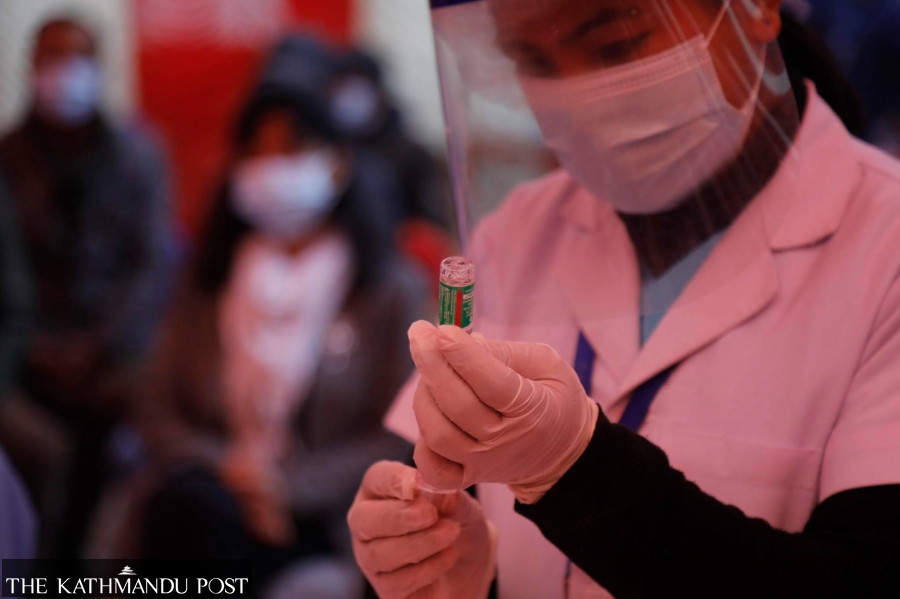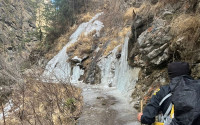National
Petroleum truck drivers given Covid-19 jabs
Experts have warned that the government’s bowing down to the pressure of strike action could encourage more such strikes and protests for jabs.
Tika R Pradhan
At a time when the authorities are under tremendous pressure to manage sufficient jabs against the coronavirus for the most vulnerable elderly population, the government has started vaccinating the drivers associated with the Nepal Petroleum Tanker Drivers Association from Tuesday following their three-day strike demanding the jabs.
Although the petroleum tanker drivers, who fall under the essential services category, had been offered the jabs in January last week along with frontline workers, they ignored the offer then, according to officials. But now after several months when the authorities are under extreme pressure to manage the limited jabs, the drivers launched a strike demanding the jabs.
However, experts have warned that the government’s bowing down to the pressure of strike action could encourage more such strikes and protests for jabs.
Recently, the government started vaccinating the 60-64-year olds in the Kathmandu Valley and 62-64-year olds outside the Valley. The eligibility criteria for those outside the Valley was narrowed down at the last minute citing limited stock.
“We have already resumed our services, which were halted for the last three days, after the government agreed to provide jabs to our drivers,” said Ishwar Lama, chairman of the Nepal Petroleum Tanker Drivers Association. “We will get the jabs from the Armed Police Force Hospital in Balambu from Wednesday.”
But chairman of the Amlekhgunj depot Committee of the Association Rajan KC said drivers there have started taking jabs on the premises of the Nepal Oil Corporation from Tuesday itself.
Lama said they were forced to go into strike for jabs after seven of their members including drivers and helpers died of the coronavirus while 73 were infected among a total of some 5,000 members.
“As per our request, the Health Ministry has managed jabs for the tanker drivers,” said Surendra Poudel, Managing Director of the Nepal Oil Corporation. “Since we fall under the essential services, the ministry has arranged the jabs for drivers.”
The government had to halt the ongoing vaccination in Kathmandu for three days due to the excessive pressure from powerful and influential people including politicians, and resumed it only from Monday.
Not only tanker drivers, but various professional organizations including the E-business Association of Nepal and the Restaurant and Bar Association of Nepal have requested the authorities to provide vaccines to their members claiming that they deal with customers all the time hence are at high risk of Covid-19 infection.
“During our meeting with the chief district officers of the Kathmandu Valley and Health Ministry officials today, we demanded that our members be provided vaccines at the earliest,” said Naresh Katuwal, chairman of the Nepal National Traders’ Federation. “Or else we will launch a protest against the government as the jabs have been misused by those having nexus with power centers.”
Katuwal claimed that the Finance Ministry has provided Covid-19 jabs even to the kin and relatives of influential businessmen.
“The vaccines should be provided equitably but that is not happening. We cannot sit idly by and watch when they are misusing the vaccines,” Katuwal told the Post.
Experts have also expressed concerns over the failure of the authorities to manage the jabs— the only known protection against Covid-19. They said the government has failed on all three fronts when it comes to combating the coronavirus—financing the jabs, using diplomatic ways to get them and properly managing them for priority groups.
“If we are unable to develop and implement a proper policy for vaccination, then people who need vaccines the most will not get them,” said Dr Sharad Onta, a public health expert. “If the government came up with a proper policy and sincerely implemented it, then people would understand the problem and stop resorting to these kinds of pressure tactics.”
He said since the government has limited doses of jabs, it should distribute them equitably ensuring that the right person gets it at the right time.
Earlier, teachers demanded the vaccines and then mediapersons and later industrialists and all of them were vaccinated. This shows the government has no proper policy on prioritisation of risk groups.
Executive director of the Covid-19 Crisis Management Centre Balananda Sharma said he has also heard about the misuse of vaccines.
“Our problem is that we did not properly define the frontline services and this is what I told the Health Ministry after monitoring the distribution of vaccines,” said Sharma. “There are reports of people threatening health workers. To implement a policy strictly we need to have a cooperative society. But we all know how things work.”
Sharma said once the government is able to procure more vaccines to inoculate at least half the population things would be easier.




 11.84°C Kathmandu
11.84°C Kathmandu













